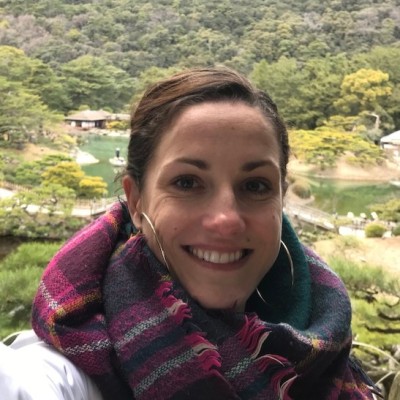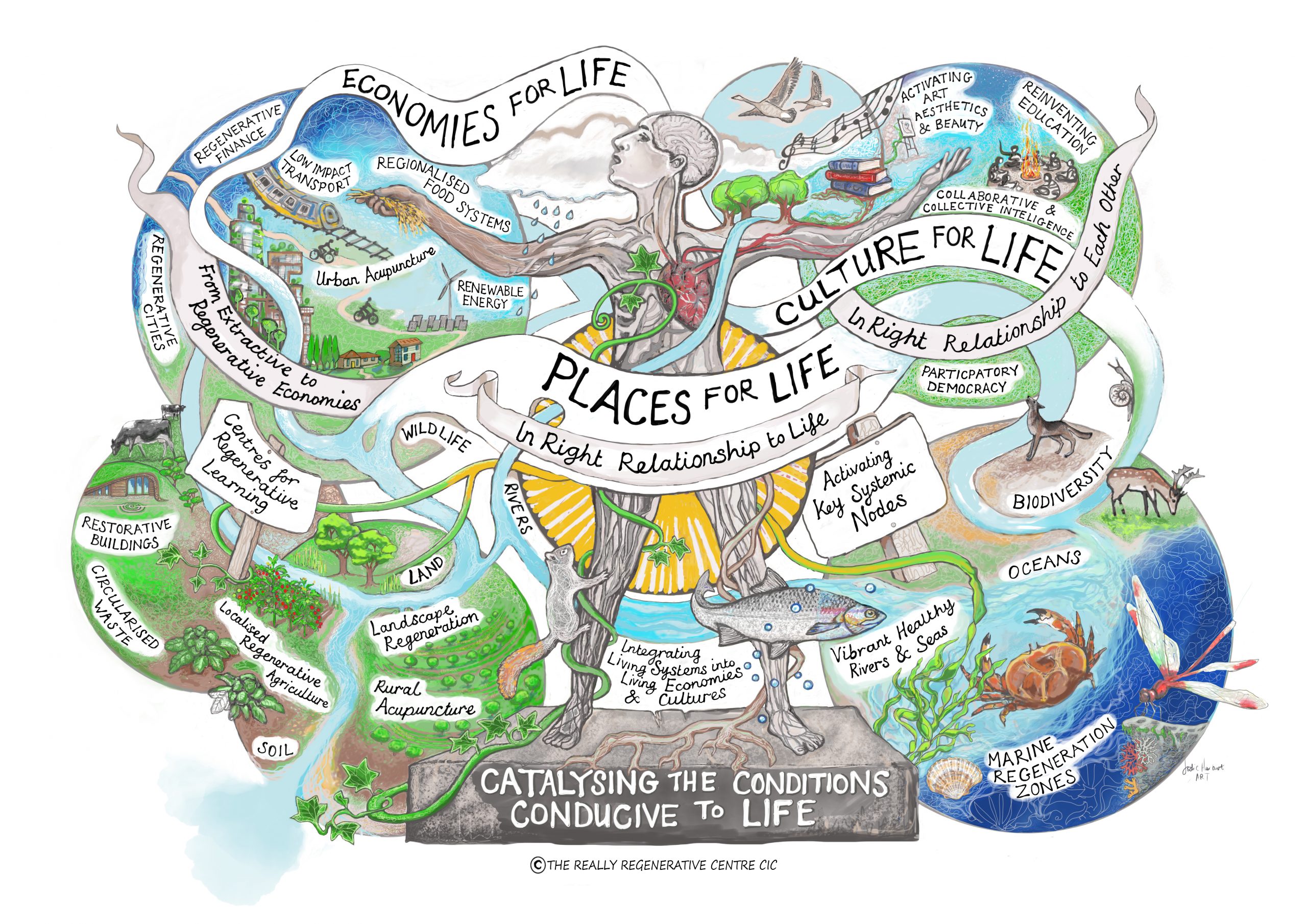REFLECTIONS FROM RACHEL CAKEBREAD, participant in POWER OF PLACE 2023

Rachel is exploring what it means to be regenerative. Her
I joined Really Regenerative’s Power of Place learning journey this year and am sitting with a question on how we create a shift to regenerative place making in our societies, when our current mode of consumption without limits dominates. Can we regenerate ourselves and our planetary systems by thinking in wholes and (re-)learn to live in relationship with the life generating systems of place?
During the course, I started to read one of the recommended books – Sand Talk by Tyson Yunkaporta1 and I was struck by his writing on civilisations:
“the ancient peoples of Zimbabwe who once made cities of stone lived within a civilization, until it inevitably collapsed. This was not an indigenous culture just because its inhabitants had dark skin. Civilisations are cultures that create cities, communities that consume everything around them and then themselves. They can never be indigenous until they abandon their city-building culture.”
We are in a globalised society of multiple city-building civilisations, that are consuming resources at an increasingly alarming rate to support consumption of an elite few. The 2023 Deloitte Circularity Gap2 report highlighted that although material consumption has raised living standards globally, after a certain point wellbeing ceases to increase and currently affluence is not equally distributed.
“In the past 50 years, the global population has doubled, yet material extraction has more than tripled. Affluence, overconsumption and waste are the real accelerators of global material demand.”
Living and working in the UK and EU for all of my life, like many Western Europeans I’m likely one of top wealthiest 10% of the global population.3 This means I am complicit in this overconsumption. I also work in the built environment, which has similarly extractive statistics. We currently outsource our consumption, whilst trying to demonstrate “sustainable outcomes” in our personal lives, businesses and industries. But can we really achieve sustainable development until we include all the externalities needed that enable our lifestyles?
The Possible Futures article on Colonial Urbanism4 highlights this global inequality: “In 2015 alone, the net appropriation from the South to North was 10.1 billion tons of raw materials, 379 billion hours of human labour, 22.7 quintillion joules of energy, 800 million hectares of land.” On top of this it has been shown there is currently enough wealth and materials in the world to provide a good quality of life to every single human being on this planet.5 Still the dominant global narrative perpetuates ideas of scarcity and competition.
Solutions to our global challenges, like net zero carbon and the circular economy also extract problems (e.g. carbon emissions and waste) from the systems within which they operate (e.g. planetary boundaries and capitalist growth). This focus on parts creates unintended consequences in the systems within which we live. For example, the Circularity Gap report highlighted that any gains we are making in circularity are meaningless as virgin material extraction continues to increase to fuel growth and GDP (the “rebound effect”). The Dark Matters Lab New European Bauhaus paper6 that Jenny shared during Power of Place which emerged from one of the projects in the programme – DESIRE – also speaks to the irony in aiming for our net zero goals without addressing the whole system of energy generation, namely gross consumption and associated planetary and human impacts:
“Solar and wind facilities require up to 15 times more concrete, 90 times more aluminium, and 50 times more iron, copper, and glass than fossil fuels or nuclear energy. Green technologies require the use of rare minerals whose mining is anything but clean, causing heavy metal discharges, acid rain, and contaminated water sources.”
The social and ethical concerns7 of local mineral mining populations also need to be included within the whole.
It seems clear we need to work on the opportunity to transform the systems we have in place that allow consumption beyond our localities. We need to meet social thresholds locally, without over-shooting planetary boundaries.5 Therefore it is of vital importance to understand how whole systems interact. We need more than an improvement or partial transition to regenerative practices. If we just focus on parts of the existing system, what do we miss? As Yunkaporta points out, should we instead be critiquing the civilisation (the institutional permanent hierarchies) that allow business as usual to continue? The question that arises for me is:
How do we create a shift from economic growth and individual status to valuing the wellbeing and health of planetary, human and non-human systems?

Starting from place, as we did in the Power of Place learning journey, we can see how we, our projects and places are nested in larger systems. We can start to image the whole system and see where we are outsourcing externalities and entropy, so that we can question how to bring these elements back within the system or encourage beneficial flows between, among and across systems. We can ask ourselves:
- What does the design produce and where does it outsource externalities to other places?
- How can we bring place, project and ourselves back into right relationship with the bioregion and within planetary boundaries?
- How do we allow for beneficial flows in the places and systems we design to create more life?
We in high-consuming societies particularly need to “prioritise immaterial ways to fulfil needs, and invest in health, wellbeing and education and decent jobs, rather than material accumulation.”2 If we have enough wealth and materials in the world to provide a good quality of life to every single human being, the opportunity is how we share these resources and circulate them within ecologies, societies and economies. We need to sense into, understand and uncover the potential to change how we live and work.
There is potential to evolve the systems we are nested in if we come back to place and understand the unique essence each place holds to regenerate living systems. We need to stop tweaking our existing (extractive) systems and “doing less bad.” We can thrive if we understand bioregional scales and place-based dynamics to generate new life and nurture the interactions between nodes and layers in these systems. This will take time: we need to stop rushing to solve problems and instead dance with the systems and complexity they hold.
What will the built environment look like if we engage with this potential? Can we begin the great “thousand-year clean-up” that Yunkaporta refers to? To create vibrant, healthy, local systems that include the knowledge and experience held by each living ecology and society? I believe there is potential in us all to re-engage with the living systems we are nested within and to co-create more vitality and life where we live. In becoming open to evolution and change, we can ask ourselves:
How do we create the conditions for care and participation that enable a shift to regenerative and sharing relationships?
The civilisations we are part of may have created externalities that have led to the poly-crises we now face, but we are also gifted with the invitation to come back to place. By weaving ourselves back into relationship with each other and the living systems within which we exist, perhaps we can be part of the regenerative future we want to see emerge.
===
References and further reading:
- Tyson Yunkaporta: Sand Talk: https://www.goodreads.com/book/show/45449501-sand-talk
- Deloitte, Circularity Gap Report 2023: https://www.circularity-gap.world/2023
- Washington Post, Richest people in the world article: https://www.washingtonpost.com/news/wonk/wp/2016/01/21/you-might-be-among-the-richest-people-in-the-world-and-not-realize-it/
- Possible Futures, Colonial Urbanism article: https://citychangers.org/editorial-colonial-urbanism/?cn-reloaded=1
- O’Neill, D. W., Fanning, A. L., Lamb, W. F., & Steinberger, J. K. (2018). A good life for all within planetary boundaries. Nature Sustainability, 1(2), 88-95. doi:10.1038/s41893-018-0021-4 https://www.nature.com/articles/s41893-018-0021-4
- Dark Matters Lab: New European Bauhaus Economy: https://www.irresistiblecircularsociety.eu/news/invitation-paper-a-new-european-bauhaus-economy-designing-our-futures


Recent Comments